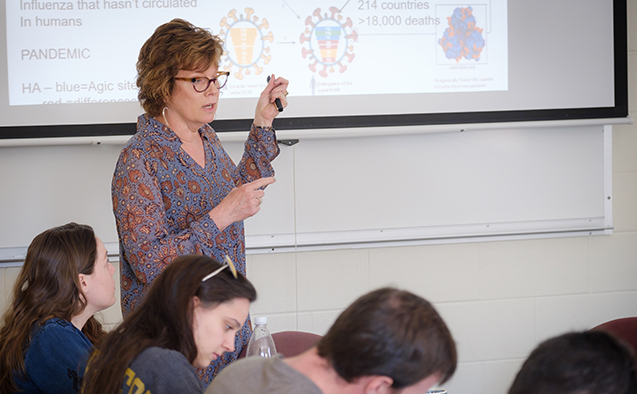WFU Expert: Containing the spread of coronavirus

With the first case of human-to-human transmission of the Wuhan coronavirus reported in the U.S., Wake Forest University virologist Pat Lord offers a word of caution: “We don’t need to be fearful. We need to be aware.”
It’s not the time for panic, said Lord, recently featured in a USA Today report about the coronavirus. More people in the U.S. die every year of the flu than have died worldwide from this coronavirus, designated 2019-nCoV. The virus was first detected Dec. 12 in Wuhan, China, a city of more than 11 million people south of Beijing.
Contracting the virus requires close contact with an infected person – and that rules out nearly all people living in the United States right now. Even so, Lord said, U.S. citizens should practice good hygiene to help prevent the spread of any virus – from flu to coronavirus. That means washing your hands, coughing into your elbow and staying home when you’re sick.
Coronaviruses have an RNA genome, just like the flu virus, which makes them more likely to mutate and spread to other species. That’s why a new flu vaccine is developed each year; the virus changes enough from season to season that the same vaccine won’t necessarily protect you.
Many novel human viruses originate in animals. In fact, scientists who published the first genome of this coronavirus found genomic sequences similar to coronaviruses in bats, Lord said. Rapid mutations of the virus with the cells allowed it to jump to a human host, and then between human hosts.
“What happens is that the coronavirus, like flu, Zika and Ebola, are always making mistakes in their genome, which means it changes the protein structure so it can “jump” to a human cell and then replicate there,” Lord explained.
Lord said we can expect to see more virus outbreaks as the world population grows and humans live in ever denser cities. Large-scale farming that depends on raising animals in close conditions increases the risk of outbreaks even more. The Wuhan outbreak has been connected to livestock sold in the city’s packed live-animal markets.
“We’re all connected by one health – environmental health, animal health and human health are all intertwined,” Lord said. “If one of those is not healthy, then it will affect the other two.”
Lord is a teaching professor in the biology department at Wake Forest. “Outbreak: Epidemics in a Connected World,” an interactive exhibit about the spread of infectious diseases that was created by Lord’s first-year seminar class, is on display through May 30 at the University’s Museum of Anthropology. The exhibit aims to show how ordinary people can help mitigate viral epidemics.
Categories: Faculty, Top Stories
Wake Forest News
336.758.5237
media@wfu.edu
Meet the News Team
Headlines
Wake Forest in the News
Wake Forest regularly appears in media outlets around the world.




